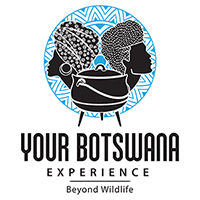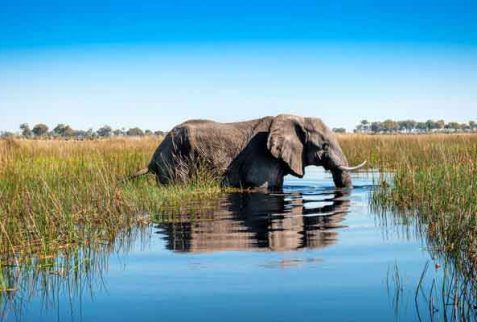Okavango Pan Handle
Before the Okavango River fans out into its familiar delta shape, its waters are channelled between parallel fault lines, this channel is commonly known as the Pan Handle, as the Delta takes on the appearance of a giant frying pan in the heart of the Kalahari. Permanent deep water has encouraged the growth of villages along the river on the western side, these communities are mainly fishermen and cattle farmers, offering a true glimpse of village life rarely seen by visitors to Botswana who normally frequent the wildlife areas only.
The Panhandle contains huge areas of unspoiled wetlands and a number of well-established lodges on the western side, offer you the chance to experience exquisite birdlife, a huge population of hippos and some of the largest crocodiles in Africa. In general wildlife is less abundant so the focus is on water based activities – motorboating and fishing. The best time for fishing is September/October and the renowned Barbel Run’s, it’s a fascinating phenomenon where both serious fisherman and beginners, can try their luck at landing the legendary Tiger Fish. It is also possible to travel by road or boat to the eastern side where community based mokoro excursions are offered. The Pan Handle is in close proximity to the ‘must see’ world heritage site of Tsodilo Hills, the spiritual home of the San and Bantu people.
Tsodilo features many well preserved specimens of ‘rock art’ and there is a small museum where it is possible to hire a local guide for a personal tour of this historical area.
Good To Know
|
Best Time To Travel
- July / August the delta is at its fullest, “Jewel of the Kalahari” days are warm but nights are cool with incredible star gazing.
- October / November the delta is at its driest awaiting local rains, the bush has died off.
- Temperatures can be very high, causing the animals to congregate around the remaining water sources, game viewing is easier
- Rainy season, Dec – March: prolific migrant bird life, animals drop their young, spectacular sunsets & the lodges offer great value for money specials.
|
What To See
- A well-rounded Safari consists of lodges that offer game drives & water activities to benefit and enjoy all terrains
- Flood plains, hosts herds of Buffalo and Lechwe enjoying the greenery, followed by predators. Hippos and Crocodiles are a given
- September – November Migrant Birds arrive
- Home to some of Africa’s rare and endangered species, Wild Dog and Wattled Crane are frequently seen.
|
|
What To Do
- Mokoro and boating at all water-based camps. Land based camps are limited to seasonal water levels for water activities
- Game drives, day and night at all land-based camps within concession areas
- Walking normally on request only
- Scenic Helicopter flights are widely available
|
What Makes This Area Unique
- UNESCO’S 1000th World Heritage site and World premier wilderness area
- Crystal clear lagoons and channels, an oasis in the middle of the world’s biggest stretch of sand, the Kalahari, reaching from Congo to South Africa.
- The true magic is in the timing of the flood! The delta is a truly wild place; it is alive and offers mind-blowing experiences on land and water year round
|
Expert Travel Tips
- If limited for time, stay in one camp for longer and pick a camp that offers a diverse range of water and land-based activities.
- To experience the diversity of the delta, combine a dry-land wildlife focused camp with a water-based camp to get the best of both.
- Please be advised that children under 16 are no permitted on mokoro’s for safety reasons
- Many lodges offer great value for money specials in rainy season
|
**Self-Drive Tips / Moremi Game Reserve / Extra section/info
- Moremi is an excellent all-round safari destination; roads are best in the dry season April – October as is Game viewing, animals congregate around permanent water sources
- Rainy Season, roads can get water logged and limit your game drive experience, Moremi has been closed on rare occasions due to heavy rains as roads become impassable
- No Fuel between Moremi and Kasane, so stock-up in Maun for all provisions
- Pre-Booked Park Fees are payable at the gate, but must be Pula cash, Credit cards (or foreign currency) are only acceptable at the wildlife office in Maun
- Khwai community area, borders Moremi Reserve and is an excellent alternative. Night driving and walking is permitted.
- Some Khwai lodges offer DBB and you can self-drive for your own activities, lovely break in a Camping trip.
|
Sorry, the comment form is closed at this time.













